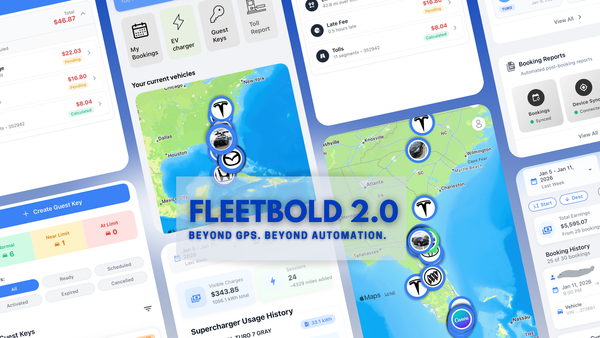How Taxes Work for Turo Hosts: 1099-K, Write-offs, and Record-Keeping

Introduction: Taxes Are Part of Hosting
Hosting on Turo can be profitable, but the IRS views your payouts as taxable income. Whether you’re casually renting out one car or running a small fleet, you’ll need to understand how income reporting works, what deductions are available, and how to keep proper records. Done right, taxes don’t just become compliance they become an opportunity to save money through legitimate write-offs.
Do Turo Hosts Receive a 1099-K?
Most Turo hosts receive a 1099-K if their earnings meet IRS thresholds. Here’s how it works:
- Current IRS rule (2025): Payment platforms (like Turo) issue a 1099-K if you earn $600+ in gross payouts in a year.
- What it reports: Your gross payouts, not your net profit. This means it does not subtract Turo’s cut, cleaning fees, insurance costs, or your own expenses.
- What if you earn less? Even if you don’t receive a 1099-K, the IRS still requires you to report income.
1099-K vs. 1099-NEC vs. No Form at All
| Form Type | When Issued | What It Reports | Who Gets It | Key Thing to Know |
|---|---|---|---|---|
| 1099-K | $600+ in payouts through Turo | Gross payouts before expenses | Most Turo hosts | Always higher than actual profit |
| 1099-NEC | Rare, used for direct contractor work | Non-employee compensation | Turo consultants, not hosts | Unlikely for hosts |
| No Form | <$600 earned | Nothing sent | New or casual hosts | Still must self-report |
SEO Note: Many new hosts Google “Does Turo send a 1099?” answer: yes, usually a 1099-K.
Write-Offs and Deductions Every Turo Host Should Know
The IRS allows you to deduct ordinary and necessary business expenses. For hosts, that means any cost directly tied to running your rental activity.
Here’s a comparison table of common deductions:
| Expense Category | Example | Deductible % | Notes |
|---|---|---|---|
| Depreciation | Wear & tear on the car | Based on IRS schedules | Major deduction, but requires proper calculation |
| Car Loan Interest | Interest on vehicle loan | % of business use | Only the interest, not principal |
| Maintenance & Repairs | Oil changes, brakes, detailing | 100% if business-related | Keep receipts; cosmetic upgrades may not qualify |
| Insurance Premiums | Commercial or rideshare insurance | % business use | Personal insurance often not deductible |
| Turo Fees & Commission | Turo’s share of rental income | 100% | Reported separately from gross payouts |
| Mileage | Driving to clean, service, or deliver the car | Standard IRS rate (67¢ per mile in 2025) | Must track with logs |
| Supplies | Key lockboxes, cleaning supplies, car mats | 100% | Easy to forget but adds up |
| Parking & Tolls | While car is in use for Turo | 100% | Must be tied to business use |
Real-World Scenarios
Scenario 1: Casual Host, 1 Car
Maria rents her Toyota on weekends, earning $7,500 gross in 2025. She receives a 1099-K. Her deductible expenses include:
- $2,000 depreciation
- $1,200 maintenance/repairs
- $500 Turo fees
- $300 car washes
Taxable income after deductions: ~$3,500
Scenario 2: Fleet Owner, 5 Cars
James operates a small fleet and earns $95,000 gross. His write-offs include commercial insurance, loan interest, and depreciation. After $45,000 in deductions, he reports $50,000 net business income. He may also need to pay self-employment tax and estimated quarterly taxes.
Record-Keeping for Turo Hosts
The IRS doesn’t just want numbers it wants proof. Good record-keeping is the difference between a smooth tax season and an audit headache.
- Keep a dedicated business bank account.
- Track every trip: Use a mileage app or Turo’s own logs.
- Save receipts for maintenance, insurance, and supplies.
- Log vehicle usage (personal vs rental).
- Use accounting software (e.g., QuickBooks, Wave, or even Google Sheets for starters).
Pro tip: Documenting expenses in real time avoids scrambling at year-end.
FAQs: Turo Taxes
Do I have to report Turo income if I didn’t get a 1099-K?
Yes. Income is taxable whether or not you received a form.
Can I deduct personal car expenses?
Only the portion used for business. Keep clear mileage and expense records.
What about sales tax?
Turo usually handles sales tax collection/remittance, but check your state rules.
Do I need to form an LLC for tax purposes?
Not required. Many hosts start as sole proprietors. LLCs may help with liability, not taxes.
Do I need to pay estimated quarterly taxes?
If you expect to owe more than $1,000 at year-end, yes the IRS requires quarterly payments.
Conclusion: Stay Ahead of Taxes, Stay Ahead in Business
Turo hosting is a business, and the IRS treats it like one. Understanding your 1099-K, using legitimate write-offs, and keeping good records ensures you not only stay compliant but also maximize profitability.
👉 Want to keep growing as a host? Check out our next guide: Turo: A Profitable Opportunity If You Do It Right.






